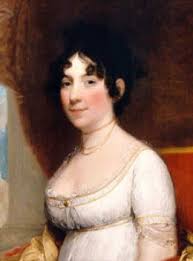
She hosted more formal dinners than any president's wife before or since. After working with Henry LaTrobe to decorate the drawing rooms in the presidential mansion, she opened those drawing rooms to the public every Wednesday night for the duration of Madison's two terms of office. Two to three hundred people attended each week and during war time, there were upwards to five hundred people attending Dolley's "squeezes."
Dolley is described as moving about the room greeting everyone in attendance with elegant ease. She was noted for her entertaining since she was able to put others at ease and make them forget they were visiting.
But why were these parties and drawing rooms so memorable? What is their significance in history?
That is what is explored in A Perfect Union: Dolley Madison and the Creation of the American Nation by Catherine Allgor.

First of all, the drawing rooms were an experiment in democracy. ALL were invited. Most congressmen of the time stayed in boarding houses in Washington. It would not be unusual to see your landlady at the drawing room. Or even to see Dolley cordially greeting them.
Secondly, she was able to unify the government by creating opportunity for politicians to see each other as people not just a political enemy. And this did not happen by accident! Dolley purposefully introduced and socialized with particular groups of politicians who she knew needed to come together for a law or other matter of government. She even was able to pacify politicians at odds and in one case was able to convince two men to call off their duel!
Most importantly, Dolley's entertaining showed off the strengths of her husband. James Madison was small, sickly, and lacked public speaking skills. But when he was at ease in his own home, he was in an environment in which he could pitch his ideas to the politicians around him. Dolley actively created that environment for her husband.
Many years ago, I heard that some churches call their pastor's wife the "first lady." How conceited and presumptuous, I thought. But through reading about Dolley Madison, I realize that I feel called to do a lot of the same things she does. I feel the Lord wants me to entertain in my home to bring people from church together. And I also feel as a wife I am responsible to create an environment at home in which my husband is able to use his strengths. Perhaps a pastor's wife is not too different than a First Lady after all.

